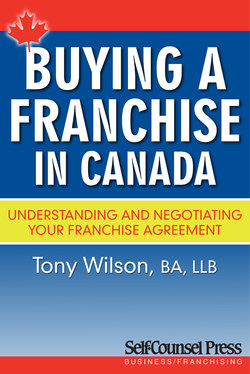Читать книгу Buying a Franchise in Canada - Tony Wilson - Страница 25
На сайте Литреса книга снята с продажи.
7. Your Personal Liability
ОглавлениеSome franchise agreements will be drafted such that a corporation that you have created is in fact the “franchisee” under the franchise agreement and that the obligations of your corporation under the agreement are guaranteed by you in your personal capacity. In other words, you, as guarantor, will be called on to pay the obligations of your company under the franchise agreement if your company doesn’t pay.
Other agreements are structured in reverse. That is, you are the individual with whom the franchisor is principally dealing and you are entitled, after execution of the franchise agreement, to assign your interest to a company that you own. In this way, you (being the individual who signed the contract in your personal capacity) will still be personally liable for the obligations of the corporate franchisee if your company fails to pay its obligations to the franchisor, but you are allowed to run the franchise through your company for tax and related reasons. Indeed, through a company you may reduce your exposure and liability to third parties. But as you originally entered the franchise agreement personally, you are still personally responsible even though you “assigned” it to your company.
Still another form of structure gaining some popularity is one in which both you and your company are collectively referred to as the “franchisee.” Remember, your company is a separate legal personality, just like you are. Here, you and your company are on the hook: your company is the franchisee but you are also the franchisee (e.g., Mr. Smith and Smithco Ltd. both signed on as franchisees and are each liable to perform their covenants and obligations under the agreement). It’s done because there are defences available to guarantors at law that might not be available to franchisees who entered the agreement in their personal capacitates. The franchisor could bring an action against you as “franchisee” or your company as “franchisee,” and it would probably bring an action against both of you, on the basis that if your company has no money, you might.
Other agreements have far more ephemeral language. They don’t refer to the guarantor of the agreement being a guarantor. Instead, they refer to the person signing the agreement in his or her personal capacity as “associate.” Whether they are called “associate” or otherwise, generally, if someone signs a franchise agreement in his or her personal capacity (i.e., using his or her personal name), he or she will be personally bound (giving credence to the old legal adage “you sign it, you eat it”).
Obviously, as a prospective franchisee, you should consider speaking to an accountant or tax lawyer about possible tax consequences in respect of each form of organization.
